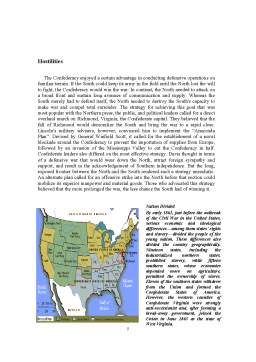Extras din proiect
The American Civil War was a military conflict (1861-1865) between the United States of America (the Union) and 11 secessionist Southern states, organized as the Confederate States of America (the Confederacy). In the South, the conflict is also known as the War Between the States.
Background
The Civil War was the culmination of four decades of intense sectional conflict and reflected deep-seated economic, social, and political differences between the North and the South. The South, overwhelmingly agricultural, produced cash crops—cotton, tobacco, and sugar cane—for export to the North or to Europe, but it depended on the North for manufactured goods and for the financial and commercial services essential to trade. Underscoring sectional differences, the labour force in the South included nearly 4 million enslaved blacks. Although the slaveholding planter class formed a small minority of the population, it dominated Southern politics and society. Slaves were the largest single investment in the South, and the fear of slave unrest ensured the loyalty of nonslaveholding whites to the economic and social system. It was to defend the right to maintain slavery that the Southern states eventually went to war.
The Sectional Controversy
To maintain harmony between the Southern and Northern supporters in the Democratic and Whig parties, political leaders tried to avoid the slavery question. But with growing opposition in the North to the extension of slavery into the new territories, evasion of the issue became increasingly difficult. The Missouri Compromise of 1820 temporarily settled the issue by establishing the 36° 30’ parallel as the line separating free and slave territory in the Louisiana Purchase. Conflict resumed, however, when the United States boundaries were extended westward to the Pacific after the Mexican-American War. The Compromise Measures of 1850 provided for the admission of California as a free state and the organization of two new territories—Utah and New Mexico—from the balance of the land acquired in the war. The principle of popular sovereignty would be applied there, permitting the territorial legislatures to decide the status of slavery when they applied for statehood.
The Shifting Balance
Despite the Compromise of 1850, conflict persisted. The South had become a minority section, and its leaders viewed the actions of the US Congress, over which they had lost control, with growing concern. The Northeast demanded for its industrial growth a protective tariff, federal subsidies for shipping and internal improvements, and a sound banking and currency system. The Northwest looked to Congress for free homesteads and federal aid for its roads and waterways. The South, however, regarded such measures as discriminatory, favouring Northern commercial interests, and it found the rise of antislavery agitation in the North intolerable. Many free states, for example, passed personal liberty laws in an effort to frustrate enforcement of the Fugitive Slave Act. The increasing frequency with which “free soilers”, politicians who argued that no more slave states should be admitted to the Union, won elective office in the North also worried Southerners. The issue of slavery expansion erupted again in 1854, when Senator Stephen A. Douglas of Illinois pushed through Congress a bill establishing two new territories—Kansas and Nebraska—and applying to both the principle of popular sovereignty. The Kansas-Nebraska Act, by voiding the Missouri Compromise, produced a wave of protest in the North, including the organization of the Republican party. Opposing any further expansion of slavery, the new party became so strong in the North by 1856 that it nearly elected its candidate, John C. Frémont, to the presidency. Meanwhile, in the contest for control of Kansas, Democratic President James Buchanan asked Congress to admit Kansas to the Union as a slave state, a proposal that outraged Northerners.
Preview document
Conținut arhivă zip
- American Civil War.doc

























